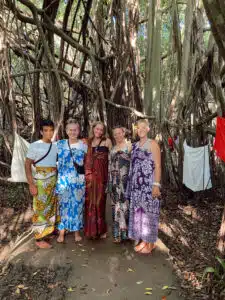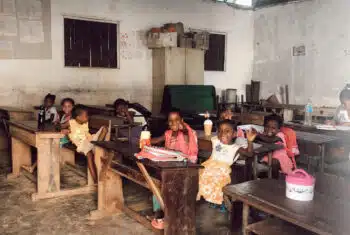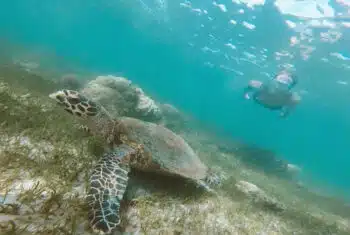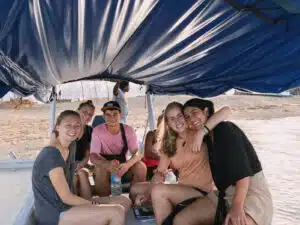Thinking about teaching abroad and have no idea what to do or where to start? This is your sign!
Becoming a TEFL volunteer teacher is one of the most rewarding and incredible things you can do while travelling the world, and you could be the next person to try it out.
These are wise words from TTA alum Hannah Gordon! Volunteer teaching is not only rewarding – it’s the ideal way to explore the field of TEFL teaching without committing to a long-term or permanent contract. But what’s it really like to volunteer teach? As a volunteer TEFL teacher, Hannah can tell us first-hand what it’s like.

The world of teaching first intrigued me when I finished high school.I had no idea what I wanted to do with the rest of my life. I knew I had a passion for people but I didn’t know how to utilise this passion to do good in the world.
My mom saw an advertisement for an overseas volunteer program in Madagascar for six weeks and signed me up at the age of 18. Little did she know she was doing me the biggest favour.
I couldn’t be more grateful that I was given the opportunity to travel somewhere new, but also to a place that was still close to my home in South Africa.
This gave me a huge sense of comfort because believe me, there were an abundance of difficulties and challenges that I faced. Ultimately, these just made the whole experience even more rewarding.
So why volunteer teach?
Whether you’ve just finished high school or university and need a break, or you’re burnt out from working your 9 to 5 job and are looking for something different, or you just want to experience new cultures and environments for a few weeks, volunteer teaching opportunities are the way to go.
My experience volunteer teaching in Madagascar changed my perspective on education, culture, and relationships, and it became more than just an opportunity to travel overseas.
Read more: 5 Reasons To Quit Your 9–5 And Become A TEFL Teacher
If you have a passion for people and you want to pursue a future career in teaching, volunteering is one of the most valuable things you can do. Volunteer teaching programs allow you to gain credible experience to put onto your CV, and it allows you the freedom to explore different communities while enriching the lives of the people living in them.
Volunteer teaching is a stepping stone to eventually get yourself into a full-time paid TEFL role and I wouldn’t be in the position I am today without it!
The experience I gained from teaching in Madagascar equipped me to deal with unpredictable classroom situations, showed me the true value of learning, and helped me realise the hard work that goes into educating the youth.
While I was volunteering with MRCI in Madagascar, I ended up joining both the turtle conservation and English teaching projects, and honestly, I loved them both. Each one gave me totally different but unforgettable experiences.
My morning routine
Hannah lived on the island of Nosy Komba, now called Nosy Ambariovato.
Every morning I woke up to the sound of the ocean in a wooden hut in the middle of the jungle. I’d start my day by brushing my teeth at the communal sink with a view of the ocean, often spotting lemurs in the trees, and enduring an ice cold shower because there was no hot water.
I would say there were around fifty to sixty people staying in the camp at a time. We would all have breakfast together in the communal area, getting to know each other while enjoying freshly baked bread and tropical fruit.
I would spend my morning planning my lessons for the day and occasionally, we would get a quick Malagasy [the local language] lesson from the locals, which helped us connect better with the children and the community.
By the end of my first week, I could say a few greetings and count to twenty.
Read more: How To Learn The Local Language
Once our lessons were ready, we’d set off through the winding jungle paths to the nearby local village where the children were waiting for us in the classrooms, bright-eyed and with smiles so big you couldn’t help but put aside any bad mood you might have had that morning.
My teaching schedule
I was initially assigned to teach English to children between the ages of 6 and 14. The students were divided into multi-age groups, often depending more on their language proficiency than on strict age brackets.
We sometimes got to teach in pairs so my friend Sarah and I would often teach together which made the lessons more playful and light-hearted.
We often left the classroom feeling such a rush of joy and happiness.
Once our classes were finished for the morning, we had some time to explore the local village, having some lunch among all the wildlife, visiting the lemur park, and getting to meet the famous King Julian. We would then walk back to camp along the beach.
By the end of my first week, I quickly realised that no two days would ever be the same.
The teaching schedule changed constantly, and most mornings I just went wherever I was told, but honestly, I loved the chaos. The lack of structure pushed me to think on my feet and made me way more comfortable with being spontaneous.
Most days I taught on our island, but sometimes I’d hop on a boat to the nearby island of Nosy Be, where I’d be greeted by a bunch of new, curious little faces.
Every day brought something different.
On a few occasions, I even ended up teaching adults, which I’d never done before. One day I was assigned a one-on-one lesson with a local policeman who wanted to improve his English. That hour ended up being one of my favourite moments from the whole trip. He was so focused and eager to learn, and the look on his face when he nailed a new word was absolutely priceless. He was beaming by the end of the lesson, and so was I!
Teaching a policeman is just one of many interesting classes you can teach in TEFL. Read more about teaching English for Specific Purposes here.
Outside the classroom, we immersed ourselves in the daily life of the village as much as we could. The community’s spirit was rooted in togetherness, in helping one another, and sharing what little they had. This reminded me so much of being back home in South Africa.
There were some days where we taught for the entire day. Then there were other days where we only taught one class and had time to explore, get involved in community life, and learn some more Malagasy.
Participating in local activities, such as playing basketball, picking bananas and just simply playing on the beach helped me build trust and deepen relationships with the people we were meeting. We would play games with the locals all afternoon, visit different cafes and restaurants that lined the beach and eat as much local food as possible.
One of my favourite parts of the whole experience was getting involved with community projects.
We spent time painting the classroom walls, fixing up the water systems, and pitching in to buy extra supplies; anything we could do to make the learning spaces better for the kids.

Challenges and rewards
While my experience was profoundly rewarding, it was not without challenges.
I knew that I only had six weeks in Madagascar and so I had to make the most of it as best I could. The first two weeks were the most difficult, many of my days filled with homesickness and missing the comfort of my home. Being in a completely new environment for the first time was no walk in the park and I quickly realised how much I had taken for granted; simple things like clean water, reliable internet, or even just being able to communicate easily.
I was completely out of my comfort zone, but that discomfort pushed me to grow in ways I never expected.
Thankfully, after those initial two weeks, everything started to shift. I settled into the rhythm of island life, finding joy in the small things, sunsets over the ocean and conversations with locals. I met some of the most incredible people, both Madagascans and fellow volunteers, who turned into close friends and a kind of chosen family.
Looking back, it’s those early challenges that made the experience so powerful, and made the memories that followed even sweeter.
Initially, the language barrier presented a major challenge.
Most of the students spoke only Malagasy, and only a few were familiar with French or English. I relied heavily on gestures, pictures, and songs to build early connections. I quickly learned that smiles, patience, and enthusiasm were more powerful than any textbook could ever be.
Read more: How To Teach English Without Speaking The Local Language
Another hurdle I had to overcome was the lack of teaching resources.
This scarcity was a constant hurdle, with no computers or printers, and access to the internet being very limited. I had to be creative in every lesson, often drawing worksheets by hand or reusing materials multiple times. Planning lessons that were engaging with limited supplies forced me to think outside the box and focus on student interaction over content delivery.
I definitely wouldn’t be the teacher I am today if it wasn’t for the experience I gained teaching in the most rural areas of Madagascar.
With limited or no teaching resources, we encourage our TEFL teachers to use the principles of what is known as Dogme in their teaching. It’s a flexible teaching methodology that can be used as necessary according to your circumstances.
Another challenge was confronting my own privilege and preconceived ideas about education.
I realised that many of the assumptions I brought with me, about what effective teaching looked like, what classrooms should contain, or how students should behave, didn’t always apply in this setting.
The students’ lives were shaped by their environments, family responsibilities, and realities that are so different from those in a Western classroom. I was reminded that education is not about imposing knowledge but more about co-creating it. The children definitely taught me more than I taught them and I learned more about myself than I had ever done before.
Despite these challenges, the rewards are what really made the experience worthwhile.
Nothing could beat waking up in the morning knowing you are about to have a day full of new experiences in a new country with new people and new lessons to learn.
I now teach English full-time in Vietnam, which has quickly become my second home. I truly believe I wouldn’t have slipped so easily into this life if it wasn’t for my time volunteering in Madagascar.
Someone close to me reminds me every day that one year living abroad equates to almost four years of living at home in your comfort zone.
Myself and many of my friends here are testament to this, considering the level of growth we have experienced moving away from our hometowns and creating new lives for ourselves, ones that challenge us and push us every day. I will be forever grateful to have experienced this in my early twenties.

Tips for future volunteer & full-time teachers
Now that you’ve heard my story, are you thinking of becoming a volunteer teacher? I really hope so!
The lessons you’ll learn won’t just stay in the classroom, they’ll stick with you for life. You’ll grow in ways you never imagined, and everything you go on to pursue or accomplish will be shaped by the experience. You’ll discover just how strong, adaptable, and capable you really are.
One of the biggest and best pieces of advice I can give you? Go in with an open mind and a flexible attitude:
- Things won’t always go to plan, and that’s okay.
- Embrace the unpredictability.
- Be patient with the people around you, but also with yourself.
You’re not going to fall in love with every moment right away, and you don’t need to. Some days will be really hard. You’ll probably feel homesick, uncomfortable, or even question what you’re doing there. But trust me, those tough moments are part of what makes the whole experience so powerful. You’ll come away from this with friendships that feel like family, stories you’ll tell forever, and a version of yourself that is wiser and a whole lot more alive.
Go for it.
Jump in.
You won’t regret it.
Author Bio
Teacher in the Field represents our TEFL Academy global community sharing their real-world experiences from classrooms and institutions across the world. From diving into TEFL to chomping down on chow mein in China, to navigating your first-day nerves in Spain, our collective voice brings authentic stories, insights, and practical advice right from those living the adventure.
Read
Teacher in the Field's story →
 United States
US
United States
US


















